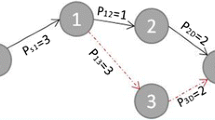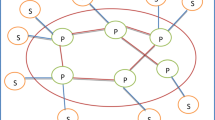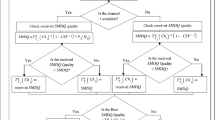Abstract
Routing protocols for cognitive radio ad hoc networks (CRNs) select a route between the source and destination nodes based on the spectrum opportunity at intermediate nodes. When multiple routes are possible, most routing protocols for CRNs use some metric—independent of the traffic class—to select routes. However, a route that works well for transferring a particular class of data may not be the right one for a different data class, as its quality of service (QoS) requirements may differ. In this paper, we propose a reactive energy efficient routing protocol with differentiated services (REEDS) for cognitive radio networks. Route selection in REEDS is based on different (multiple) hop metrics calculated dynamically for different traffic classes so that a minimum level of QoS is guaranteed. Another characteristic feature of REEDS is the prediction and dodging of nodes that may be excessively loaded with traffic. This results in the avoidance of formation of holes due to heavy energy expenditure by some nodes. Simulation shows that routes in REEDS are established so that the QoS requirements of each traffic class are satisfied and lesser energy is consumed compared to other routing protocols for CRNs.









Similar content being viewed by others
References
Mitola, J., & Maguire, G. (1999). Cognitive radio: Making software radios more personal. IEEE Personal Communications, 6(4), 13–18.
Badoi, C. I., Prasad, N., Croitoru, V., & Prasad, R. (2011). 5g based on cognitive radio. Wireless Personal Communications, 57(3), 441–464.
Wu, Q., Ding, G., Xu, Y., Feng, S., Du, Z., Wang, J., et al. (2014). Cognitive internet of things: A new paradigm beyond connection. IEEE Internet of Things Journal, 1(2), 129–143.
Alrabaee, S., et al. (2012). Routing management algorithm based on spectrum trading and spectrum competition in cognitive radio networks. In Seventh international conference on broadband, wireless computing, communication and applications (BWCCA) (pp. 614–619).
Youssef, M., et al. (2013). Routing metrics of cognitive radio networks: A survey. IEEE Communications Surveys & Tutorials, 16(1), 92–109.
Moursi, S., & EINainay, M. (2013). A Multi-metric routing protocol with service differentiation for cognitive radio networks. In 16th ACM international conference on modeling, analysis & simulation of wireless and mobile systems (MSWiM) (pp. 129–134).
Al-Rawi, H. A. A., & Yau, K. L. A. (2013). Routing in distributed cognitive radio networks: A survey. Wireless Personal Communications, 69(4), 1983–2020.
Saleem, Y., et al. (2015). Routing and channel selection from cognitive radio networks perspective: A survey. Computers & Electrical Engineering (Elsevier), 42(23), 117–134.
Abdelaziz, S., & Elnainay, M. (2014). Metric-based taxonomy of routing protocols for cognitive radio ad hoc networks. Journal of Network and Computer Applications, 40, 151–163.
Caleffi, M., Akyildiz, I. F., & Paura, L. (2012). Opera: Optimal routing metric for cognitive radio ad hoc networks. IEEE Transactions on Wireless Communications, 11(8), 2884–2894.
Pefkianakis, I., Wong, S. H. Y., & Lu, S. (2008). Samer: Spectrum aware mesh routing in cognitive radio networks. In 3rd IEEE symposium on new frontiers in dynamic spectrum access networks, 2008 (pp 1–5). DySPAN 2008.
Sampath, A., Yang, L., Cao, L., Zheng, H., & Zhao, B. Y. (2007). High throughput spectrum-aware routing for cognitive radio networks. In International conference on cognitive radio oriented wireless networks and communications (CROWNCOM).
Abbagnale, A., & Cuomo, F. (2010). Gymkhana: A connectivity-based routing scheme for cognitive radio ad hoc networks. In INFOCOM IEEE conference on computer communications workshops, 2010 (pp. 1–5).
Zhu, G. M., Akyildiz, I. F., & Kuo, G. S. (2008). StOD-RP: A spectrum-tree based on-demand routing protocol for multi-hop cognitive radio networks. In 2008 IEEE global telecommunications conference. IEEE GLOBECOM 2008 (pp. 1–5)
Cheng, G., Liu, W., Li, Y., & Cheng, W. (2007). Joint on-demand routing and spectrum assignment in cognitive radio networks. In 2007 IEEE international conference on communications (pp. 6499–6503).
Yang, Z., Cheng, G., Liu, W., Yuan, W., & Cheng, W. (2008). Local coordination based routing and spectrum assignment in multi-hop cognitive radio networks. Mobile Networks and Applications, 13(1–2), 67–81.
Kamruzzaman, S. M., Kim, E., & Jeong, D. G. (2011). Spectrum and energy aware routing protocol for cognitive radio ad hoc networks. In 2011 IEEE international conference on communications (ICC) (pp. 1–5).
Pyo, C. W., & Hasegawa, M. (2007). Minimum weight routing based on a common link control radio for cognitive wireless ad hoc networks. In 2007 international conference on wireless communications and mobile computing, IWCMC ’07 (pp. 399–404).
Chowdhury, K. R., & Akyildiz, F. (2011). CRP: A routing protocol for cognitive radio ad hoc networks. IEEE Transactions on Selected Areas in Communications, 29(4), 794–804.
Rehman, R. A., Sher, M., & Afzal, M. K. (2012). Efficient delay and energy based routing in cognitive radio ad hoc networks. In 2012 international conference on emerging technologies (ICET) (pp. 1–5).
Cai, Z., Duan, Y., & Bourgeois, A. G. (2015). Delay efficient opportunistic routing in asynchronous multi-channel cognitive radio networks. Journal of Combinatorial Optimization, 29(4), 815–835.
Ping, S., Aijaz, A., Holland, O., & Aghvami, A. H. (2015). Sacrp: A spectrum aggregation-based cooperative routing protocol for cognitive radio ad-hoc networks. IEEE Transactions on Communications, 63(6), 2015–2030.
Vazifehdan, J., et al. (2011). Energy-aware routing algorithms for wireless ad hoc networks with heterogeneous power supplies. Computer Networks (Elsevier), 55(15), 3256–3274.
Kim, D., et al. (2002). Power-aware routing based on the energy drain rate for mobile ad hoc networks. In IEEE Eleventh International Conference on Computer Communications and Networks (pp. 565–569).
Abbagnale, A., & Cuomo, F. (2010). Connectivity-driven routing for cognitive radio ad-hoc networks. In 7th annual IEEE communications society conference on sensor mesh and ad hoc communications and networks (SECON) (pp. 1–9).
Felice, M. D. (2011). NS-2 simulator extension for cognitive radio networks. http://krc.coe.neu.edu/?q=node/16.
Author information
Authors and Affiliations
Corresponding author
Rights and permissions
About this article
Cite this article
Kalabarige, L.R., Chilukuri, S. Supporting QoS Differentiation in Energy-Constrained Cognitive Radio Networks. Wireless Pers Commun 97, 2459–2474 (2017). https://doi.org/10.1007/s11277-017-4617-1
Published:
Issue Date:
DOI: https://doi.org/10.1007/s11277-017-4617-1




